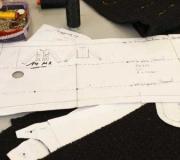Learn English for the little ones. English - for kids
English for children from 1 year old is not very similar to a lesson in its usual sense. English classes with kids are mostly English-language “staging” with a small plot, poetic stories, English songs, funny pictures and interesting drawing-crafts. At the same time, no, including new, foreign words are translated into Russian for the baby. The child should become interested in a language that is incomprehensible to him and, immersing himself in the English-speaking environment, listen and absorb. Quite often, very young students at first just listen, listen and listen to the English speech of the teacher, and then they begin to give out whole constructions.
In order for the child to be immediately involved in the process of learning games, the child can be accompanied by a parent in the Polyglot Center. As soon as the student finds contact with the teacher and stops losing mom or dad, he can independently stay in English lessons for the smallest.
Age features of training
English language courses for kids are divided into several subspecies. With children from one to 2 years old, teachers are engaged in the presence of parents. In addition to learning a foreign language, special attention is paid to early development. The teacher in his work uses finger games, mobile tasks that encourage kids to act, learns short poems and songs with his wards. One of the affordable and effective ways to provide information is watching cartoons in English. The main task of the teacher is to interest children, to make them want to learn the language and develop. The teacher is working on preparing the child for a more intensive course, teaching him to intuitively recognize and understand foreign speech.
The English language program for kids from 2 years old is aimed at ensuring that the child speaks as early as possible. With regular attendance at classes, children develop perfect pronunciation and there are no grammatical errors. This level combines tasks for the little ones and is the basis for regular learning. The teacher still devotes a lot of time to games, but the children are more at the table, doing creative assignments. A competent approach allows you to increase the child's vocabulary several times in a year. In the structure of the classes there are songs, dances, small poems and nursery rhymes.
There are many websites in English for children on the Internet. Among them come across both good and not so good. In this review, I will talk about several interesting resources that will be useful to parents who decide to study English with children, as well as teachers.
Warning: I am neither an English teacher nor a parent. However, I am well acquainted with the sites referred to in the review, I used them myself and recommend them to others, including acquaintances who study English with their children.
"Teacher Method" - detailed English lessons for children 5 - 10 years old
Another popular site in English Puzzle English(also with very wide functionality) offers large and very detailed courses for beginners "Teacher Method". Courses are made in the form of a game. In the Teacher Method, theory is given not only in the form of text, as in Lingvaleo, but also in short videos with teachers.
Classes are held according to the scheme "explanation - exercises - test":
- The teacher explains a new topic.
- You are doing some exercises.
- After completing several lessons, you take an exam (test).
Most of the site's features are free, but some features are paid, for example, some modes of memorizing words, almost all courses.
Separately, it is worth highlighting the course, designed, in fact, for the smallest.

There are three blocks of tasks in the course:
- We learn the alphabet.
- My family and pets.
- How do you feel?
Classes are held in the form of interactive tasks, where you need to choose the correct answer, match a word and a picture, add words from letters, etc. Like all courses, “English for the little ones” can be taken in a free demo mode to understand he or not.
Duolingo - English for kids in a playful way

There are such cute cards on the British Council
On this site you will find materials for preschool and primary school children: songs, short stories, videos, games, exercises, etc. All of them are well designed. For example, if you open a video, it will not just be a page with a video (which everyone watched), but a whole set of tasks: first, an exercise where you need to match words and a picture, then a video, then a test, plus a pdf is attached to the video -files for printing - text from the video, assignments and answers.
- Listen and Watch- videos and exercises for them. Songs are highlighted in a separate sub-heading.
- Read and Write– short reading texts and simple writing exercises (for example, sign a picture).
- Speak and Spell– video and text materials, pronunciation exercises (reading rules) and spelling.
- Grammar and Vocabulary- video lessons (skits), grammar exercises and games. The rules are explained very simply.
- Fun and Games- mini-games for learning English.
- Print and Make- printout materials: vocabulary cards, coloring books, mini-worksheets (worksheets) and others.
- Parents- a section for parents with articles, useful tips on how to help children learn English. Includes video tutorials where teachers explain how to play educational games with young children.
Also, the British Council has released a number of mobile applications, on this page their list: http://learnenglishkids.britishcouncil.org/en/apps.
InternetUrok.ru - free online school curriculum lessons
Where can I find cartoons in English?
There are many cartoons in English created specifically for educational purposes. There are skits, dialogues, new words are explained, etc. Here's where to find them:
- On YouTube- Youtube is full of such cartoons, it will not be difficult to find them. For example, here a selection of educational cartoons about the dragon Gogo and his friends. In this series for kids, simple words and phrases are given in small stories about the adventures of a funny dragon.
- In the English Conversation for Kids app is not a tutorial, but simply a collection of YouTube videos conveniently sorted into directories. The same cartoons about the dragon Gogo and many others. The app is available on Android.
- On Lingualeo. In the “Materials” section there is a topic “For Children”, which includes such cartoons. The disadvantage is that they are collected randomly, plus - the presence of convenient subtitles with a translation that pops up when pressed.
In addition to educational cartoons, there are just cartoons that you can watch without translation. But this, of course, is a more difficult task. They can be found on Puzzle Movies (Puzzle English section with series) - in addition to TV shows and series, this service also has cartoons.

I would like to devote this article of my blog to the topic of English for the smallest kids. Many parents believe that if they themselves do not speak English or do not know it at a sufficient level, as it seems to them, then their crumbs are not necessary, in any case, in the future, studying with tutors and teachers at school, he will be able to achieve results in this area.
However, they do not think about a very important point, which was mentioned in their writings by Masaru Ibuka and Shichida, famous innovators in the field of early childhood development. I'll tell you what the point is.
Each language has its own wave frequency. The languages of the European group are next to each other in frequency, the Russian language is close to Ukrainian and Belarusian, but Chinese and Japanese are on a completely different level.
Initially, when a child up to a year old hears the voices of parents and the voices of other people, he can only distinguish between different levels of sound waves and may try to adapt to any of the above heard waves. When a child begins to speak, he has already fully adjusted to the wave of the sound of his parents' voice, thereby choosing the language that will be considered his native language. If he has multilingual parents, then the baby will speak fluently in 2 languages and will consider them native.
Therefore, Shichida and Masaru Ibuka advise from the very birth of a child to include in his life different languages, especially difficult to understand and different in frequency from the Russian language.
While the baby's brain is growing intensively and absorbing all the information that surrounds him, with special effort, be sure to fill his life with English, and if possible, other languages.
How to get started with the little ones?
Audio
When the baby is 2-3 months old, you can slowly include English in his life. Start with simple musical lullabies, poems, simple dialogues in English. From time to time turn on music, dialogues, songs, poems, videos or cartoons: let them go in the background. The kid will listen and tune in to the frequency of the sound of the English language. For example, here you can download a good CD with songs in English - click on the picture:
Very good disk and books with assignments:
Video for babies up to a year
When a child reaches 1 year old or so, books, flashcards, and the first small cartoons and video programs teaching English can be included in his life. Here you can download Your Baby Can Read discs for free, developed by the American doctor Robert Titzer. Three parts are laid out on the rutracker. There are 5 parts in total, they are also offered cards with words and pictures for video recording.
The film itself is intended for kids from 3 months to 5 years. From my personal experience, I advise you to start watching a video film no earlier than 6 months.
In addition, do not watch the entire video film at once, but in small pieces during the day. Each disc is intended for daily viewing for 1-2 months, depending on the comprehensibility of the material by the baby. You can check the results on the cards that are attached to these discs. You can download free CDs with English for kids here - click on the picture:

Cards
From the age of 1, I also advise you to buy or purchase the simplest cards in English.
Similar cards can be downloaded and printed on my website. For example, these are.
For example, these cute cards with words in pictures in English for kids are sold in the Labyrinth - click on the picture to learn more about this product in the store:

Include picture cards with the English alphabet in your English lessons. They can be downloaded for free on my website. Click on the link to select the desired cards, where available.
Learn colors
Presentations for the little ones
There are also very good English slides for toddlers on a disc called Baby Prodigy. English for little ones in pictures download, free of charge here:
Books and poetry
From about 1.5 - 2.5 years old, include fairy tales, in English for kids.
For example, the Labyrinth sells a very good series of Russian folk tales and other simple stories in English for kids. The books are called Reading Together. I have been reading these books to my daughter since she was 1.5 years old. She still asks me to read them from time to time and knows them almost by heart. You can buy books here - click on the pictures below. The books are inexpensive and very useful. You can also buy CDs for these fairy tales, which are read by professional announcers in English especially for children. You can buy this disc here.
You can also buy CDs for these fairy tales, which are read by professional announcers in English especially for children. You can buy such a disc here - click on the picture below:
Top 50 English Songs
Video materials for children from 1.5-2 years old
From about 2 years old, I advise you to supplement your English classes with various videos in English for kids - these can be various cartoons, tutorials, video lessons, songs and much more. From what my daughter likes to watch, I would like to highlight:
Magic English
Magic English - English lessons for little ones:
Here and disks, and books, and interactive tasks. Peppa Pig - English cartoons for the smallest kids - click on the picture to download for free.
Baby Jake - cartoons and videos in English about 11 month old baby Jake. Click on the picture to download English for little ones for free: English for kids - cartoons little Pim (about panda). You can download here:
Songs and poems are very important for children's perception of the English language. With an older baby, you can memorize short rhymes in English. For example, you can learn or sing songs and poems "Good night" in English with your baby. Surely the child is already familiar with the song "Good night" in Russian, which is present in the program "Good night, kids." You can take an analogue of a song in English and sing it: the music and verses of Good Night will already be familiar.
Educational literature for little ones
For children from 4 to 6 years old there is a very good series of English books for kids by the author N.A. Bonk and I.A. Bonk. This includes a textbook, a workbook, handouts, audio materials, games, song scenes, and even copybooks. Bonk's textbook is a completely new technique. In Bonk's manuals, all texts are built on the speech turns of the language, which makes them possible to use even for studying at universities.
Textbook "English for younger students" I.A. Shishkova, M.E. Verbovskaya is designed for primary school children. Set by I.A. Shishkov, M.E. Verbovskaya includes a 2-part textbook, a workbook and discs with notes. The textbook "English for junior schoolchildren" by I.A. Shishkova, M.E. Verbovskaya, edited by N.A. Bonk, so that the methods in them are largely similar. I.A. Shishkova, M.E. Verbovskaya offer game teaching methods that help children successfully cope with the study of a foreign language. Lessons given to children by I.A. Shishkova, M.E. Verbovskaya, will surely come in handy for your child.
English for kids Shishkova, Verbovskaya, Bonk, can be downloaded here for free - click on the picture below -

To learn the alphabet of the English language, you can apply lessons on videos and cartoons that Luntik, the favorite hero of children, gives. There are video games and cartoons where Luntik tells children about what letters exist and how they are pronounced. Luntik sometimes does not act alone: he is helped by true friends from the cartoon. Video games, lessons and cartoons, where Luntik teaches the English alphabet with the guys, will surely come in handy. You can download video games and cartoons in which Luntik operates.
So, if you want your kid to know a foreign language well, use games, poems, songs, cartoons, the alphabet in pictures from an early age. Immersion in the language environment will definitely give its results.
Modern parents, who care about the bright future of their children, more and more often come up with the following question: when, how and where to start learning English with a child?
And not without reason, because knowledge of a foreign language, especially English, makes dreams of such a future closer.
English: when to start?
You can start learning a language at any age, but the most favorable period is the age from 1.5 to 9-10 years. In this rather wide time period, the involuntary memory of the child is best developed. He is able to memorize everything “on the fly”, as they say, on an intuitive level, without making any special efforts.

There are techniques that allow you to start learning from the cradle, even when the baby does not speak his native language. It is proved that any early study of foreign languages bears fruit. Psychologists believe that such a child is really ahead of his peers in his mental development. But not in an emotional way, so in an effort to raise a genius, do not forget that every kid needs a carefree and joyful childhood, and he needs lively communication and a smile than perfect knowledge of the English alphabet at 2 years old.
Children's language abilities
Does the child have the ability to learn languages? Will time and effort be wasted? Imagine: the baby is already drawing a little with pencils. Will he be able to draw with a brush and paints? Naturally! After all, he is already painting. So it is with language. The kid is already starting to communicate in his native language, which means that there is an ability for languages! Of course, for the perfect command of a foreign speech, specific talents are needed, as in any other field of science and art. But when it comes to learning a language to broaden your general horizons in order to have a solid foundation for the further development of language skills and abilities, any kid can do it.

What skills should a child have to start learning English?
To learn foreign languages, every kid must be able to listen, see, repeat (at least in his own way), draw, run, crawl, jump, etc. A foreign language with young children is always a game. And every child can play. Important: he must know in his native language what he has to learn in English! You should not learn colors in English if the baby does not understand them yet.
How and where to study English
You can study the language at home, together with your parents, or in a children's studio, or invite a nanny-tutor who speaks a foreign language. It makes sense to send a child to a children's studio if he is 4-5 years old or more. At this age, learning in a team will be beneficial. Small children under 3 years old, as a rule, have not yet acquired the skills of playing together, full communication with their peers, so it is better to work with them at home.

If at least one of the parents has a conversational level of language proficiency, the best option would be to communicate with the baby from birth in two languages. For example, an English-speaking father and a Russian-speaking mother. Growing up in a language environment, the child quickly acquires communication skills in a foreign language. In this case, both languages will be native for the baby.
Mom and dad remember only a couple of words and phrases from the school English course, or have they studied another language before? Not scary. There are textbooks for toddlers and their parents with detailed methodological advice and pronunciation instructions. There are many Internet sites where you can absolutely free download audio recordings in English and texts for them. And parents are given a wonderful opportunity to learn English themselves and teach their child.
English from scratch for children: where do we start?
It is pointless for little children to start learning a language from the alphabet. Especially if they have not yet mastered the technique of reading in their native language. The main goal of parents should be: to instill in the child an interest and love for a foreign language, and then wait for grandiose results.
Based on this goal, you need to start with what is of interest to the baby. The theme "Animals" "Toys", "Household items" will be a great start. It is convenient to use visual aids - cards for teaching children the language. They can be bought or made with your own hands in accordance with the level of knowledge and interests of the child.

It is not bad to look at books, even if they are in Russian. The main thing is to name what is shown in the pictures in English. In addition to nouns denoting objects and animals, you need to teach the child during normal communication the most common verbs and verb phrases, such as give me, take, come to me, look at, etc. Cartoons, songs, poems in English will develop the child's language hearing .

Education should be unobtrusive and like the child. The duration of the lessons is from 5 to 15 minutes. The younger the child, the shorter the session. It is important to have time to finish your "lesson" before the baby gets tired and starts to be distracted, so that he wants to return to this type of activity again.
How to teach a child to think in English
There are different methods and different approaches to teaching children foreign languages. Some classical methods are based on a strong theoretical basis. It is described in detail in scientific papers, pedagogical monographs and works. In its purest form, the phased study of English "from words to grammar" was used in Soviet schools. Most private English courses for children and tutors adhere to this methodology. In practice, all this baggage of theory is not very effective.

English for children, especially the smallest, should be fun! It should not become a subject of study and cramming, but a full-fledged means of communication. What technique has proved to be so effective that just 3-6 months after the start, the guys not only speak fluently in a foreign language, but also think in it?

An innovative method for teaching English to children in Russia is a communicative approach. In fact, it is a practical communication with a native speaker or a teacher who is fluent in English. The focus is on speaking and listening to speech. The technique is known and successfully applied in the West. In Russia, the pioneer (and monopolist) of innovative technology was the network of Children's Language Centers "Polyglotiki", which has existed since 2006. This unique author's technique was first used by the founder of the "Polyglotiki" centers in the cultural capital of St. Petersburg and was a resounding success. Today "Polyglotiki" is an international network with 60 branches in dozens of different cities in Russia and neighboring countries.

All English language courses for children offered at the Centers for learning from 2 to 12 years of age are based on a communicative methodology with elements of a classical approach. Maximum immersion in a foreign language environment naturally stimulates bilingualism in a child, and not only ... After all, he studies both the basics of the language itself and begins to easily understand mathematics, natural sciences, literature and creative tasks in English. That means it's evolving!

The main goal of the Polyglot teachers is to teach the child to perceive the language, speak, and then think in it. No mechanical repetition! Only impromptu game tasks in English, creative skits, demonstrations, musical and animated shows, colorful cards and posters, gestures, facial expressions and communication with a native speaker. So English for children develops not only memory, but also intelligence and logic! And new knowledge contributes to the development of mental abilities and the successful further education of children in Russian and foreign schools.
You need to return to English lessons at least 3 times a week so that the knowledge gained is firmly entrenched. And, of course, this new “English game” for the child should bring him joy and pleasure!




